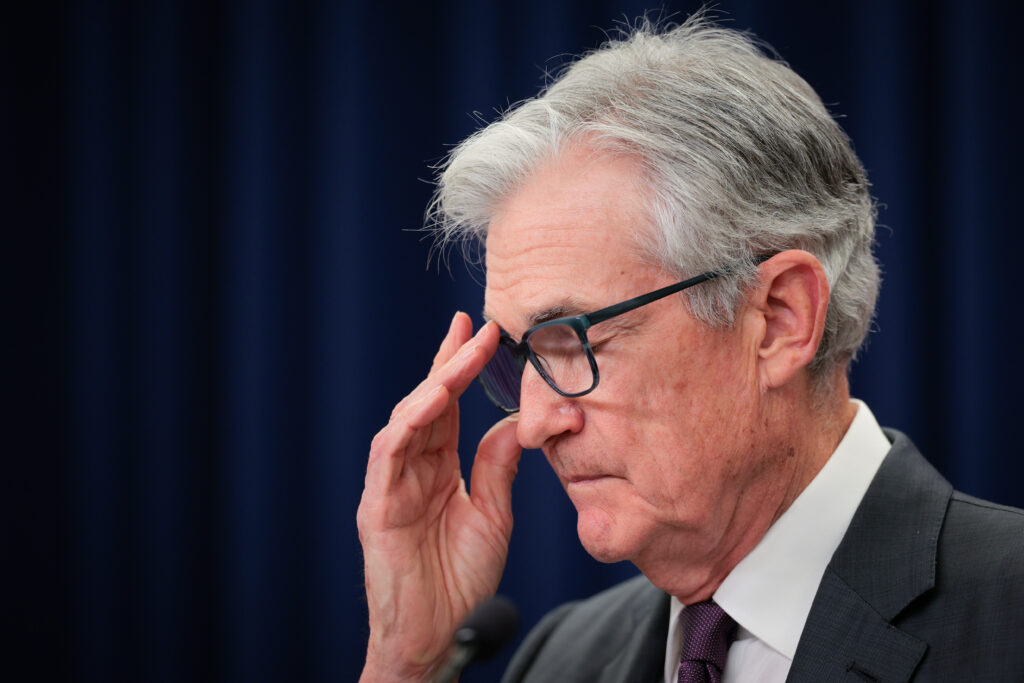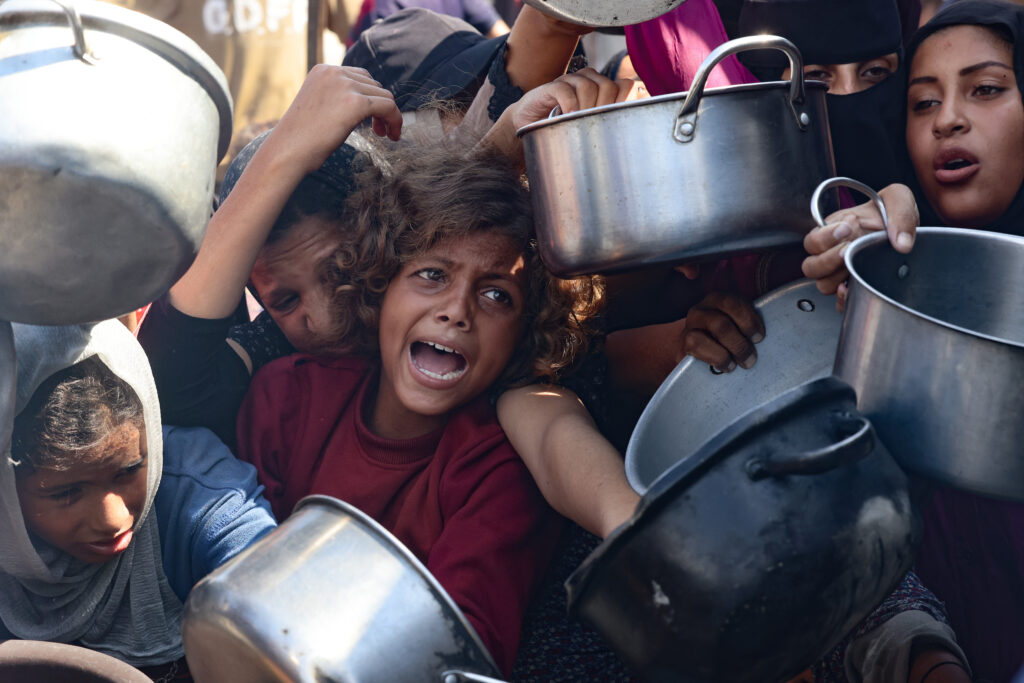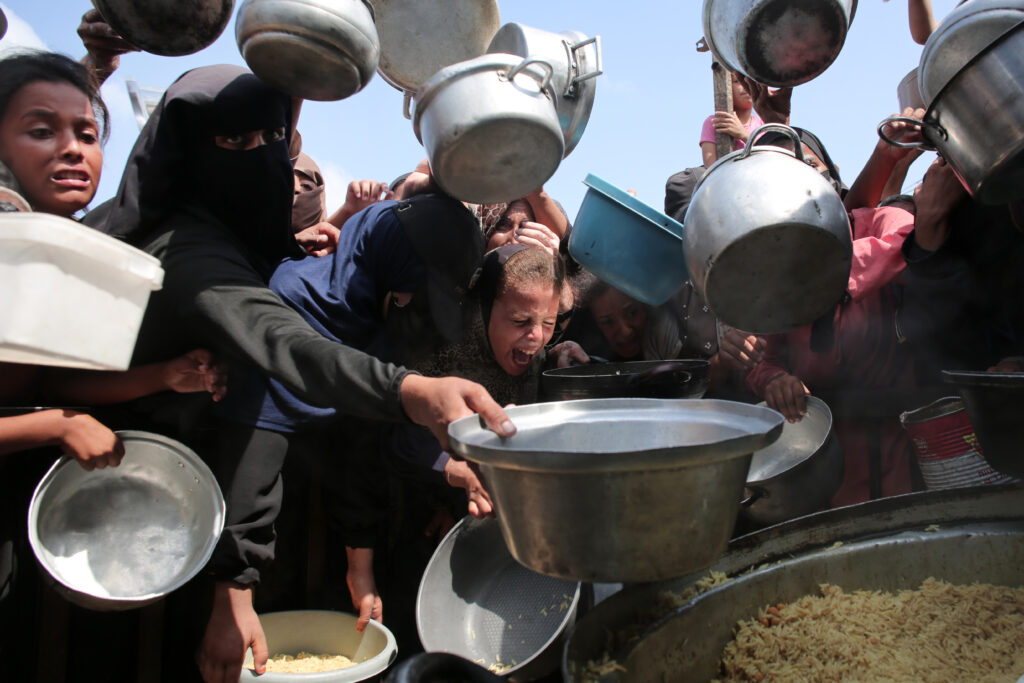AFP Asia Business
Wall Street rallies, dollar drops as Fed chief fuels rate cut hopes
Wall Street shares rallied Friday as US Federal Reserve chief Jerome Powell left the door open to cutting interest rates, which also sent the dollar dropping against the euro and other major currencies.Investors had been eagerly waiting for Powell’s speech all week, hoping to hear hints that the Fed would cut rates at its next …
Wall Street rallies, dollar drops as Fed chief fuels rate cut hopes Read More »
Dutch foreign minister resigns over Israel sanctions showdown
Dutch Foreign Minister Caspar Veldkamp resigned on Friday after a cabinet meeting failed to agree to sanctions against Israel.The centre-right New Social Contract Party, of which Veldkamp is a member, withdrew from the governing coalition after the resignation, adding to growing political chaos in the country.Veldkamp had said on Thursday that he wanted new measures against Israel over its iron-fisted tactics in the Gaza war against Hamas.Last month the Netherlands declared far-right Israeli ministers Itamar Ben-Gvir and Bezalel Smotrich persona non grata. It was also among 21 countries that signed a joint declaration on Thursday condemning Israel’s approval of a major West Bank settlement project as “unacceptable and contrary to international law”.But after the cabinet became deadlocked Friday over possible new measures to increase pressure on Israel, Veldkamp told ANP he was “insufficiently able to take meaningful additional measures”.”I feel constrained in setting the course I consider necessary as foreign minister,” he added.Veldkamp said the further steps he had proposed against Israel were “seriously discussed” but that he had encountered resistance in successive cabinet meetings.The government has been under pressure from protests against Israel’s military campaign since the October 7, 2023 Hamas attacks on Israel unleased the war.Demonstrations in The Hague drew between 100,000 and 150,000 people — the largest in the Netherlands in two decades. Protesters demanded sanctions on Israel and humanitarian access for civilians in Gaza, where on Friday the United Nations officially declared a famine and blamed “systematic obstruction” of aid by Israel.- No EU consensus -EU foreign ministers have repeatedly failed to reach an agreement on collective sanctions against Israel, despite pressure from several member states.Proposals under discussion have included suspending Israel’s participation in a 900-million-euro ($1 billion) EU science and technology programme, trade restrictions and visa bans for specific Israeli officials.In the Netherlands, Veldkamp told parliament in a letter released at the time that Ben Gvir and Smotrich “repeatedly incited settler violence against Palestinians, promoted illegal settlement expansion, and called for ethnic cleansing in Gaza”.Smotrich in response accused European leaders of surrendering to “the lies of radical Islam” and “rising antisemitism”. Ben-Gvir said he would continue to act for Israel, even if banned from “all of Europe”.Veldkamp said the further steps he had proposed against Israel were “seriously discussed” but that he had encountered resistance in successive cabinet meetings.Hamas’s October 2023 attack resulted in the deaths of 1,219 people, mostly civilians, according to an AFP tally based on official figures.Israel’s offensive has killed at least 62,192 Palestinians, most of them civilians, according to figures from the health ministry in Hamas-run Gaza that the United Nations considers reliable.The Dutch government had already called new elections for October 29 following the withdrawal of Gert Wilders’ far-right Freedom Party (PVV) from the coalition in June.Prime Minister Dick Schoof told the Dutch parliament that he regretted the resignation of Veldkamp and the withdrawal of his party, the fourth biggest in the chamber, as the fragile government heads into the election campaign.Schoof acknowledged that events in Gaza were “worsening” and “dramatic”. “Everyone is aware of that,” he told deputies.
Dutch foreign minister resigns over Israel sanctions
Dutch Foreign Minister Caspar Veldkamp resigned on Friday after a cabinet meeting failed to agree sanctions against Israel.Last month Veldkamp declared far-right Israeli ministers Itamar Ben-Gvir and Bezalel Smotrich unwelcome in the Netherlands.The Netherlands was also among 21 countries that signed a joint declaration on Thursday condemning Israel’s approval of a major West Bank settlement project as “unacceptable and contrary to international law”.But after a cabinet debate on Friday about further possible measures to increase pressure on Israel were deadlocked, Veldkamp told ANP he was “insufficiently able to take meaningful additional measures”.On Thursday Veldkamp said he wanted to take further steps against Israel but later acknowledged he lacked confidence he could act effectively in the coming weeks or months.”I feel constrained in setting the course I consider necessary as foreign minister,” he said.At home, the minister had been under pressure from a wave of protests against Israel’s more than 22-month military campaign against Hamas militants in Gaza and what activists described as Dutch inaction.The demonstrations in The Hague drew between 100,000 and 150,000 people — the largest in the Netherlands in two decades. Protesters demanded sanctions on Israel and humanitarian access for civilians in Gaza, where on Friday the United Nations officially declared a famine and blamed “systematic obstruction” of aid by Israel.Israel’s Prime Minister Benjamin Netanyahu swiftly dismissed the findings.- No EU consensus -EU foreign ministers have repeatedly failed to reach an agreement on collective sanctions against Israel, despite pressure from several member states.Proposals under discussion have included suspending Israel’s participation in a 900-million-euro ($1 billion) EU science and technology programme, trade restrictions and visa bans for specific Israeli officials.In the Netherlands, Veldkamp told parliament in a letter released at the time that Ben Gvir and Smotrich “repeatedly incited settler violence against Palestinians, promoted illegal settlement expansion, and called for ethnic cleansing in Gaza”.Smotrich in response accused European leaders of surrendering to “the lies of radical Islam” and “rising antisemitism”. Ben-Gvir said he would continue to act for Israel, even if banned from “all of Europe”.Veldkamp said the further steps he had proposed against Israel were “seriously discussed” but that he had encountered resistance in successive cabinet meetings.Hamas’s October 2023 attack that sparked the war resulted in the deaths of 1,219 people, mostly civilians, according to an AFP tally based on official figures.Israel’s offensive has killed at least 62,192 Palestinians, most of them civilians, according to figures from the health ministry in Hamas-run Gaza that the United Nations considers reliable.
UN declares famine in Gaza, Israel rejects ‘lie’
The United Nations officially declared a famine in Gaza on Friday, blaming “systematic obstruction” of aid by Israel during more than 22 months of war, with Prime Minister Benjamin Netanyahu swiftly dismissing the findings.Palestinian militant group Hamas urged the United Nations to “stop the war and lift the siege”, calling for unrestricted access for food, medicine, water and fuel.Netanyahu, whose defence minister meanwhile threatened an even more intense offensive, rejected the UN-backed report as “an outright lie”.The Rome-based Integrated Food Security Phase Classification Initiative (IPC) said famine was affecting 500,000 people in the Gaza governorate, which covers about a fifth of the Palestinian territory including Gaza City.Israel has pressed ahead with plans to seize Gaza City despite an international outcry, saying that taking the territory’s largest city is key to defeating Hamas.The IPC projected that the famine would expand to Deir el-Balah and Khan Yunis governorates by the end of September, covering around two-thirds of Gaza.With the vast majority of the territory’s population displaced at least once, the UN said nearly a million people currently live in the northern Gaza governorate.UN agencies and aid groups had warned for months of a looming famine in Gaza, where Israel has severely restricted aid and at times completely cut it off during its nearly two-year war with Hamas.COGAT, an Israeli defence ministry body which oversees civil affairs in the Palestinian territories — including coordinating aid to Gaza — argued that the IPC’s findings rely on “partial data and unreliable sources”.UN aid chief Tom Fletcher said the famine was entirely preventable, saying food could not get through to Palestinians in need “because of systematic obstruction by Israel”.UN Secretary-General Antonio Guterres called for a ceasefire, saying: “We cannot allow this situation to continue with impunity.”- ‘Man-made catastrophe’ -UN human rights chief Volker Turk said it was “a war crime to use starvation as a method of warfare” — a charge for which the International Criminal Court in November issued an arrest warrants for Netanyahu.In a statement, Netanyahu said “Israel does not have a policy of starvation”, citing figures on aid it had allowed into Gaza.The IPC report said that “over half a million people in the Gaza Strip are facing catastrophic conditions characterised by starvation, destitution and death”.It said the deterioration between July and August was the most severe since it began analysing hunger in Gaza, driven by a sharp escalation in the war and restrictions on supplies.In early March, Israel completely banned aid from Gaza for two months.Speaking in Geneva, the UN’s Fletcher said: “It is a famine that we could have prevented if we had been allowed. Yet food stacks up at borders because of systematic obstruction by Israel.”The International Committee of the Red Cross said the famine declaration “must serve as a catalyst for immediate and concrete action”.Britain’s top diplomat David Lammy said Israel’s “refusal to allow sufficient aid into Gaza has caused this man-made catastrophe. This is a moral outrage.”- ‘We are dying’ -Israeli Defence Minister Israel Katz earlier warned that “the gates of hell will open upon” Hamas leaders, specifically in Gaza City, “until they agree to Israel’s conditions for ending the war, primarily the release of all hostages and their disarmament.”Military chief Eyal Zamir said “we are expanding operations in Gaza in the coming days”.Late Thursday, Netanyahu said he had ordered negotiations aimed at freeing the hostages still held in Gaza since the Hamas attack that triggered the war — 49 people, including 27 the Israeli military says are dead.The Israeli premier said the diplomatic push would accompany the operation to take control of Gaza City.Mediators have been waiting for an official Israeli response to their latest ceasefire proposal, which Hamas accepted earlier this week.On the ground, Gaza’s civil defence agency said Israeli fire killed at least 57 people on Friday, more than half of them in Gaza City.Umm Mohammed Nasr, a 42-year-old mother of four from Gaza City, said that “the bombing hasn’t stopped since this morning… but we have no idea where to go”.”We are dying,” she said.Media restrictions in Gaza and difficulties in accessing many areas mean AFP is unable to independently verify the tolls and details provided by the civil defence agency or the Israeli military.Hamas’s October 2023 attack that sparked the war resulted in the deaths of 1,219 people, mostly civilians, according to an AFP tally based on official figures.Israel’s offensive has killed at least 62,192 Palestinians, most of them civilians, according to figures from the health ministry in Hamas-run Gaza that the United Nations considers reliable.
UN declares famine in Gaza, first ever in Middle East
The United Nations on Friday officially declared a famine in Gaza, the first time it has done so in the Middle East, with experts warning 500,000 people face “catastrophic” hunger.”It is a famine: the Gaza famine,” said Tom Fletcher, the UN’s emergency relief coordinator, as the IPC panel found famine was now present in and around Gaza City.He blamed Israel, accusing it of “systematic obstruction” of aid deliveries to the war-ravaged Palestinian territory.Israeli Prime Minister Benjamin Netanyahu slammed the UN-backed report as “an outright lie”, while the foreign ministry insisted: “There is no famine in Gaza.”The assessment of famine was made by the Integrated Food Security Phase Classification Initiative (IPC), a coalition of monitors tasked by the UN to warn of impending crises. It defines famine as occurring when 20 percent of households have an extreme lack of food; 30 percent of children under five are acutely malnourished; and at least two in every 10,000 people die daily from outright starvation or from malnutrition and disease.UN agencies have long been warning of the deteriorating humanitarian situation in Gaza, particularly as Israel steps up its offensive against Hamas.The Rome-based IPC said that “as of 15 August 2025, famine (IPC Phase 5) — with reasonable evidence — is confirmed in Gaza governorate”. The UN estimates that nearly one million people currently live in the Gaza governorate.”Over half a million people in the Gaza Strip are facing catastrophic conditions characterised by starvation, destitution and death,” the IPC report said.It projected famine would spread to the Deir el-Balah and Khan Yunis governorates by the end of September, with the number of people starving expected to rise to 641,000.The IPC said it was “the first time a famine has been officially confirmed in the Middle East region”. A famine was projected in Yemen in 2018 but never officially confirmed, despite the humanitarian crisis in the country, a spokesman told AFP.- ‘Haunt us all’ -The IPC said the famine in Gaza was “entirely man-made”, driven by a sharp escalation of the conflict in July, massive displacement of people since mid-March and restricted access to food.In early March, Israel completely banned aid supplies from Gaza, before allowing very limited quantities to enter at the end of May, leading to severe shortages of food, medicine and fuel.Speaking to reporters in Geneva, Fletcher said the famine should “haunt us all”.”It is a famine that we could have prevented if we had been allowed. Yet food stacks up at borders because of systematic obstruction by Israel,” he said.UN rights chief Volker Turk said “it is a war crime to use starvation as a method of warfare”.UN Secretary-General Antonio Guterres renewed calls for an immediate ceasefire and full humanitarian access to Gaza, adding: “We cannot allow this situation to continue with impunity.”The International Red Cross described the declaration of famine as “devastating and entirely foreseeable”.”Under international humanitarian law, Israel, as the occupying power, must ensure that the basic needs of the civilian population in Gaza are met,” it said in a statement.- ‘Too weak to cry’ -In July alone, more than 12,000 children were identified as acutely malnourished — a six-fold increase since January, according to UN agencies.”The signs were unmistakable: children with wasted bodies, too weak to cry or eat, babies dying from hunger and preventable disease,” said UNICEF Executive Director Catherine Russell.The local food system has collapsed, with an estimated 98 percent of cropland in the Gaza Strip either damaged, inaccessible or both, the IPC said. Livestock is decimated and fishing is banned.Gathering information is extremely difficult in Gaza.The IPC said conditions in the North Gaza Governorate, north of Gaza City, may well be worse, but said it did not have enough data.Israel’s foreign ministry asserted that a “massive influx of aid” had entered the Gaza Strip in recent weeks, while Israeli defence body COGAT accused the authors of relying on partial data.However, Jean-Martin Bauer, director of the UN World Food Programme’s food security analysis, said the IPC was the “gold standard” for these kind of assessments.burs-ar/jj




